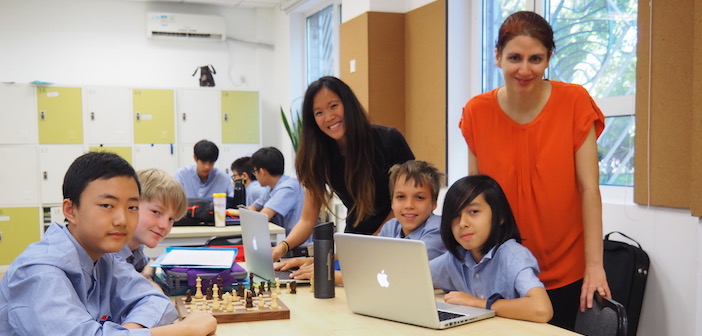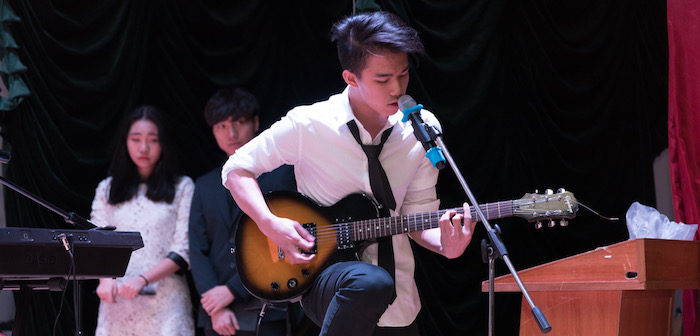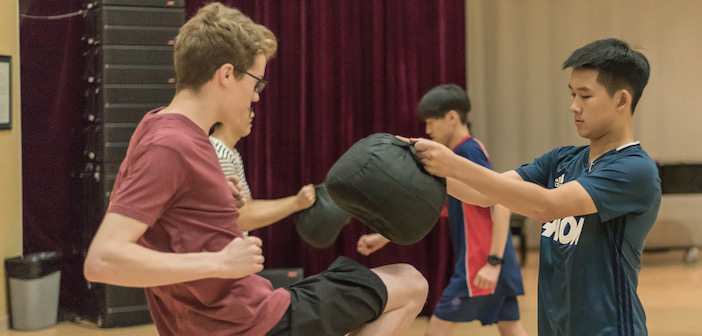Have you ever thought about what it means to be well educated in the 21st century? In a modern world increasingly driven by software and automation, it is important for educational institutions to focus on developing skills that stem from uniquely human qualities such as curiosity, creativity, compassion, and social intelligence. To be able to critically analyze information, form independent opinions, innovate, collaborate and communicate, to be self-motivated, take on responsibility and lead by influence, to be able to adapt to change – these are some of the real competencies delivered by Yew Chung International School of Beijing’s (YCIS Beijing) commitment to education of the “whole person.”
Set in a culturally diverse, completely bilingual environment, the educational experience at YCIS Beijing is delivered through a unique co-teaching model where the best of Eastern and Western practices are fused together in order cultivate true international-mindedness. Through their Character Education Programme, charitable initiatives such as the Seeds of Hope Project, and various other co-curricular activities, YCIS Beijing nurtures self-motivated lifelong learners who are equipped with the practical skills required to achieve career success as well as to become caring, responsible global citizens.

Schooling at YCIS focuses on education of the whole person
To help realize their vision, YCIS Beijing offers an International Baccalaureate Diploma (IBDB) Programme. The world-renowned, pre-university course taken in Years 12 and 13 is comprised of a sophisticated academic curriculum that demands the best from students and teachers. IBDP also includes mandatory components such as Creativity Action Service (CAS), aimed at challenging students to apply their knowledge while developing vital personal and interpersonal skills.
In order to complete the IB Diploma Programme (IBDP), students are required undertake a ‘live’ project that is interwoven with the three elements of CAS – Creativity (experiences that involve the arts or other creative thinking), Activity (experiences that involve physical activities that contribute to a healthy lifestyle) and Service (experiences involving unpaid, voluntary exchanges that have learning benefits). Through CAS, students develop local and global awareness as well as learn skills in goal setting, planning and strategizing, perseverance, leadership, collaboration, and reflection.
In order to meet the “Service” element of CAS, every year, YCIS Beijing organizes a CAS Fair to help students establish links with NGOs. This year the CAS fair at YCIS Beijing attracted multiple NGOs, including the UK-based Migrant Children Foundation, The Starfish Project, Jane Goodall Institute’s Roots & Shoots, and local charity Educating Girls of Rural China. Many of the students signed up to support the NGOs’ work through marketing, fundraising, teaching, and organizing events, as part of their CAS project.

Students work on the “Creative” aspect of CAS
When asked about how students fulfill the Creative and Active elements, YCIS Beijing’s CAS Coordinator and Technology Integrator, Mr. Satyendra Arora, spoke about the Cog and Gear club, a student-led cycling club that runs on the weekends. “In the past, students have also organized a Fun Run, a fund-raiser marathon for the staff and parents where they managed the entire event”, added Ms. Lianne Yu, IGCSE Programme Coordinator.
CAS projects also help students explore new interests and career paths and can be a useful tool to enhance college applications. “CAS is different from normal extracurricular activities in the sense that it’s not something that is timetabled into the school hours…we want students to come up with their own projects,” Ms. Yu added. Mr. Arora also explained how documentation and reflection are an important part of CAS. “We encourage students to ask three questions: why, how, and what. It helps students reflect on their activities and it enables us to ensure that students hit all of the learning outcomes that the CAS programme is based on.”

Staying active is another important part of CAS
But with so many schools offering the IBDP programme, what’s different about CAS at YCIS Beijing? In order to increment the learning outcomes of CAS, younger students in Years 9-11 have their own compulsory YCIS Challenge designed by the school to mirror and prepare the students for CAS. Ms. Yu, who manages the YCIS Challenge, explained that the idea is to expose younger students to aspects of service and charity. As a result, the entire school community gets involved and these co-curricular activities become deeply embedded into student life, creating a more lasting impact. For example, for the 30 Hour Famine Project, the students fast for 30 hours to raise funds as part of CAS and the YCIS Challenge. “You can read about hunger and poverty online”, said Mr. Arora, “but these kinds of projects really help students understand what hunger is.”
“Parents are really proud of the students’ accomplishments through CAS and the YCIS challenge”, he added.
CAS and the YCIS challenge encourage students to engage in meaningful service and sustainability practices while learning to navigate real-world situations. YCIS students graduate not only as academically informed individuals but also as thoughtful citizens who value resourcefulness, resilience, and humility.
This post is sponsored by YCIS Beijing.
Photos courtesy of YCIS Beijing


